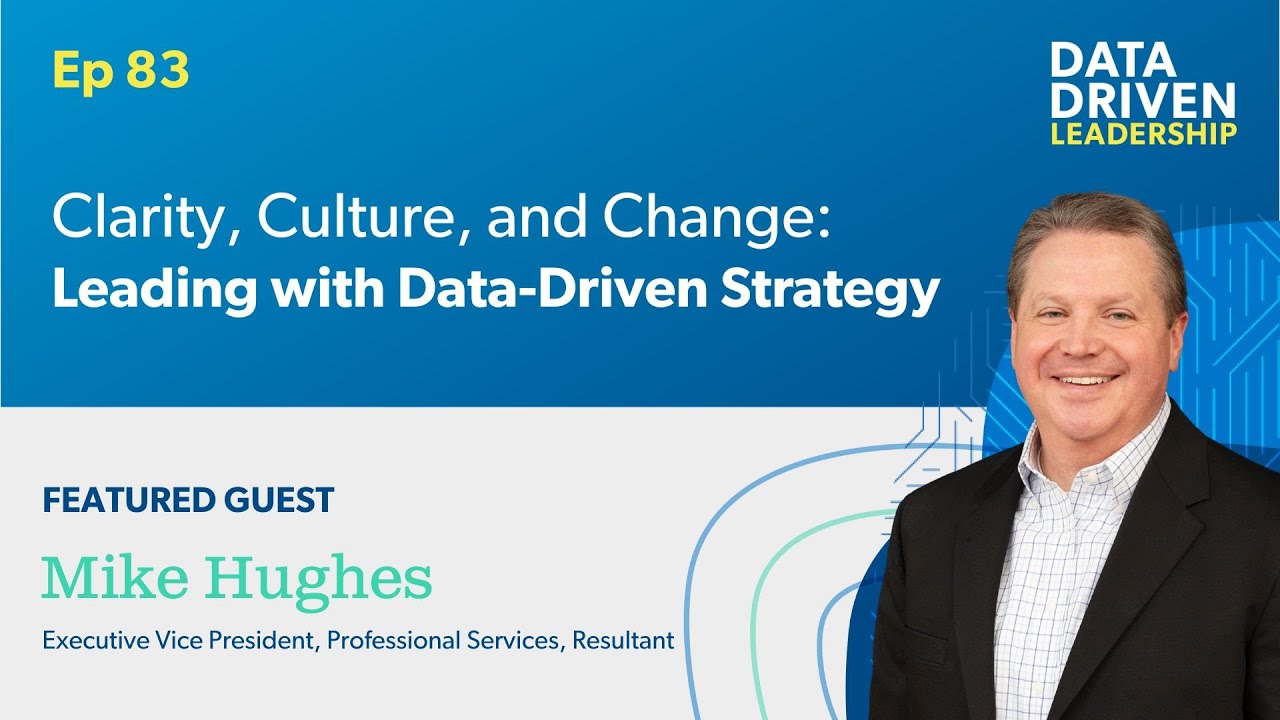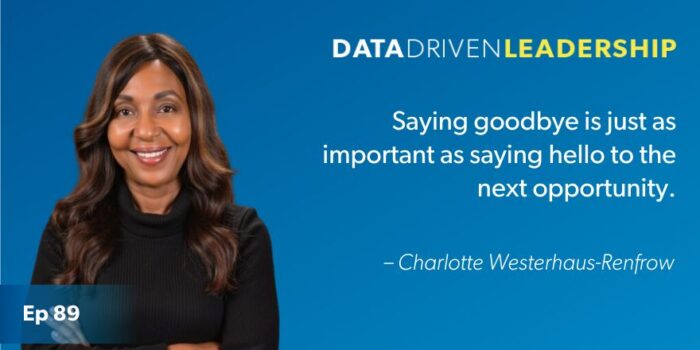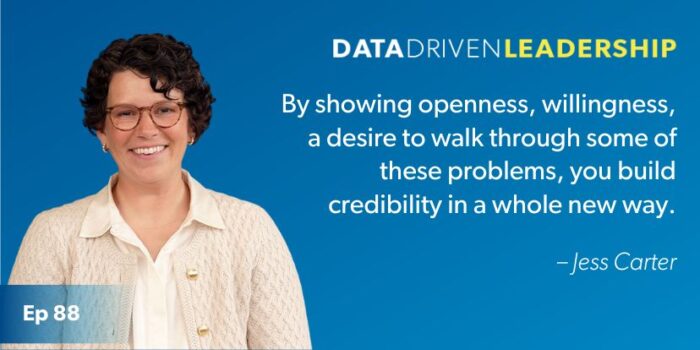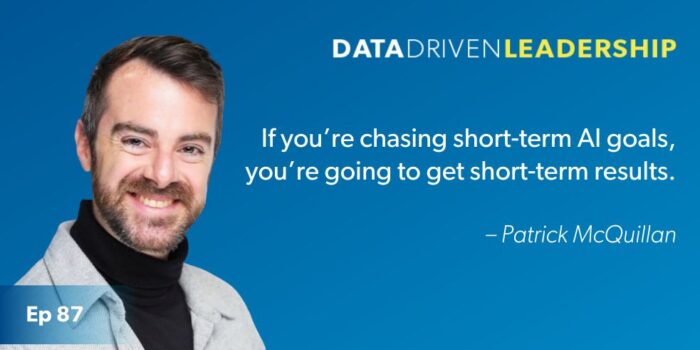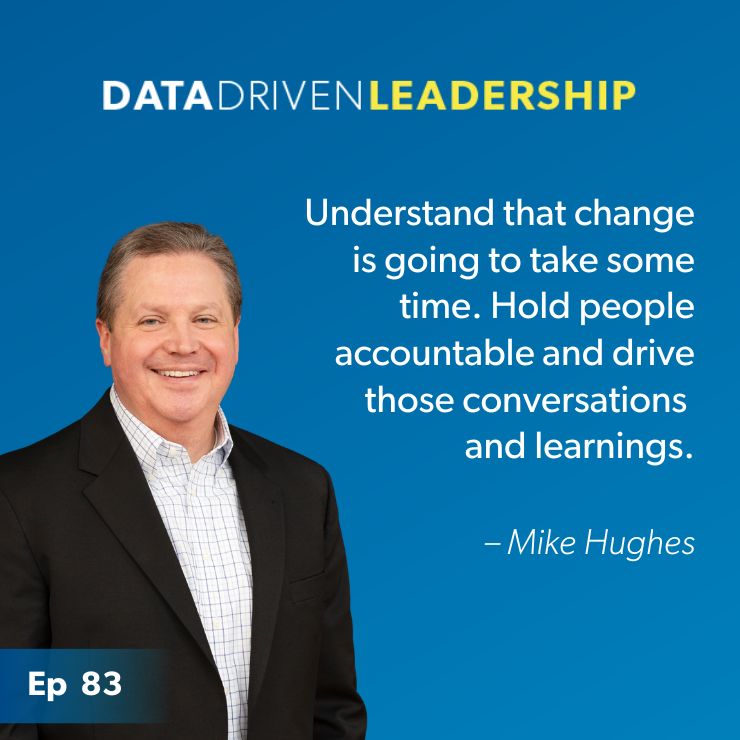
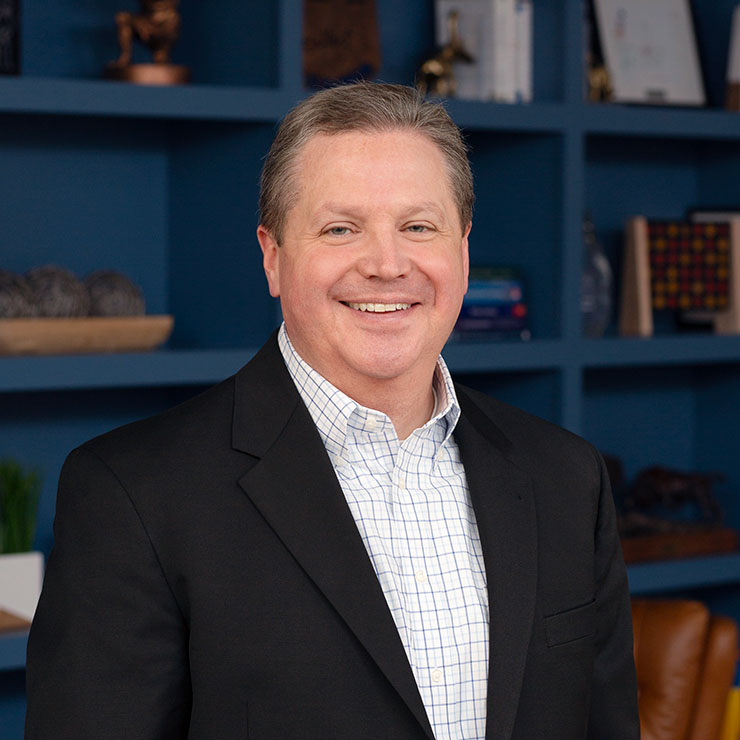
Transcript
This has been generated by AI and optimized by a human.
Jess Carter (00:04):
The power of data is undeniable and, unharnessed, it's nothing but chaos.
Show ID (00:09):
The amount of data was crazy.
(00:11):
Can I trust it?
(00:12):
You will waste money.
(00:14):
Held together with duct tape.
(00:15):
Doomed to failure.
Jess Carter (00:16):
This season, we're solving problems in real time to reveal the art of the possible: making data your ally, using it to lead with confidence and clarity, helping communities and people thrive. This is Data-Driven Leadership, a show by Resultant.
Hey, everyone. Welcome back to Data-Driven Leadership. Today we're thrilled to have Mike Hughes joining us, our new executive vice president of professional services here at Resultant. Mike has a remarkable track record of helping organizations tackle complex challenges and evolve through major shifts to the fast-paced, client-driven world we live in today. He's been at the forefront of transforming how consulting firms deliver, driving smarter, faster, and more intentional work that aligns with what clients truly need. Beyond that, he's deeply passionate about organizational health and has a sharp instinct for recognizing when a company is thriving and when it needs some support.
In this episode, Mike shares practical insights on how consulting firms can evolve to meet market demands, how leaders can quickly assess the health of their organization and how culture rooted in clarity, history, and shared purpose can become a company's greatest value proposition.
We talk about what makes a great consultant in today's landscape, the balance between experience and fresh perspective, and how new tools like AI are reshaping early careers. Mike's superpower is clarity, knowing exactly what outcomes you're driving toward, building shared language around strategy, and communicating fully to the path ahead. This one's packed with real-world wisdom for anyone leading teams, building cultures, or driving change. Let's get into it.
(01:53):
Welcome back to Data-Driven Leadership. I'm your host, Jess Carter. Today we have Mike Hughes, the new executive vice president of professional services here at Resultant. Let's get into it. Mike, welcome.
Mike Hughes (02:04):
Thank you, Jess. Looking forward to the conversation.
Jess Carter (02:07):
Awesome. Well, hey, I am going to jump right in. So you've spent most of your career in consulting, is that fair?
Mike Hughes (02:15):
All of my career in consulting.
Jess Carter (02:17):
All of your career in consulting. Okay. So I want to start with why. It is a high-burnout field. It can kind of be a grind. Why? How do you think you got caught into it and why did you stay for so long?
Mike Hughes (02:29):
So how I got caught into it, to be honest, I don't know. So, started during graduate school. I had an opportunity to talk to a consulting firm. I was going to be a professor, that was my goal. But we had a consulting firm come into one of our classes and it happened to be a legal consulting firm, and I was just intrigued. So opportunity to help people out, bring your expertise into different situations. And so, started out in legal consulting. I was actually a trial consultant, jury analyst, more behind the scenes because I was young, like crunching data and things like that. Change management was my area of passion. And back then it was still not quite a thing yet. So some firms were doing it and Accenture was one of those firms that... back then Andersen Consulting was one of the firms that had a dedicated change practice, and so got the opportunity to go do that.
(03:23):
And I just loved the variety. So, being able to work with different clients, bring different levels of expertise and thinking to different problems that our clients were having. And then I got to explore building and helping to build practices and really loved that of how do we think about offerings and services and changing those to meet different market needs and different client problems and all those types of things. And so it stuck. The other thing is, as you mentioned just about high burnout, it's also what you make of it, right? And so I'm very proud that I think I've been a good dad to my daughter, Maggie, hopefully a good husband to Kathleen. But just finding balance throughout all of that.
(04:11):
And I look back on my career and I kind of measure it by the people that I was lucky to work for and work with. And so had great mentors. Dan Wolf back when I was in litigation sciences and doing that legal stuff, Michael Parks, who was the CEO of The Revere group, and he was the person who kind of taught me about that balance, being present and making sure you're spending time with your family, doing all that. A variety of different people from West Monroe who kind of continue that mentoring, Doug Armstrong, several others. And I think that's why I've stuck with it just because I've been able to keep that passion going, but do it in a way that I was able to balance it with everything else that I wanted to do as well. I love what I do.
Jess Carter (04:52):
This is interesting to me. So you've been a consultant for a while, you've led consultants for a while. Here's a quick prompt. If you were meeting with a best buddy of yours over coffee on a Saturday and they needed to hire a consultant, what do you think makes a great consultant? If you were going to hire one yourself, what are you looking for in that person?
Mike Hughes (05:12):
I hate this phrase, but it's so true: It's the balance of art and science. So consulting is the ability to understand a problem, know that there are different ways to attack it, right? Proven methodologies, proven approaches, accelerators, tools, all these different things. But it's the artistry that makes a good consultant. So I use the analogy of a painter. I have all kinds of different paint on my palette and I know how to paint, but the true artist knows how to mix colors. And it's that balance of knowing I've got the tools and knowing I've got the paintbrush and I've got all the other things, but it's the artistry of what is this situation called for? What is this specific client need? How do I add the greatest value? So it's that kind of true balance.
Jess Carter (05:58):
Yeah, that makes sense.
Mike Hughes (05:59):
And finding that within somebody, somebody that can think out of the box, somebody that can ask the right questions, somebody who is willing to be in the background because it's not about us, it's about our clients and what we're trying to do to help them to solve a problem. Those are some of the things that I would look for.
Jess Carter (06:17):
Do you think clients' expectations have changed over time?
Mike Hughes (06:22):
I'll say yes and no. So I think no, from the aspect of clients are still looking for us to add the greatest value that we can. They're spending money, they're taking on risk by bringing in outside. And so they want the greatest value from us. They expect us to bring ideas and solutions to the table. And I think still a big expectation is that we're helping them. We're leaving them better off than when we got there. And that's how I've always kind of closed out a project is have I left the situation better than when I got here? The other thing is we have to stay ahead of the game. So clients are expecting us to bring those ideas, that knowledge to the table. We're not learning it for the first time. We're bringing a breadth of experience from either the same industry, same type of problems, different things like that. Well, obviously times have shifted, and so things that may have changed at a pace before of every one-to-three years are things that are changing now monthly, if not daily. I go back to when I started in this, and again, it's been a long time. I'm getting old, but...
Jess Carter (07:29):
It's not that old. For anyone who's not watching the video.
Mike Hughes (07:32):
We talk like, Hey, what's a three-year strategy? It's hard now. There are no three-year strategies, right? Strategies are changing faster. And so because of that, those expectations have changed. Of we need to be on top of things changing at a faster pace than they ever have. We are solving problems that are very different—again, if not monthly, daily, annually. And so I think those level of expectations maybe have changed.
Jess Carter (07:59):
This is a humble brag. In my last Indianapolis Business Journal article, my whole thing was about you can't set and forget strategy anymore. You can't predict a three-year plan. You have to manage the strategy. It requires that at this point with the pace. And the other thing I really liked that you said, I kind of always picture all of my client work is like it's chiseling me, too, as a consultant. I am better because I went through it, too. They're better off and that's the whole point, or they wouldn't buy it. But to me, a big challenge for consulting I think is we have to get the cycles in to younger, earlier career consultants faster because there is a level in which if I'm doing a really hard project, I want someone who has been through it three-plus times and really knows where all the skeletons are in my next 18 months of lived experience and helps me avoid them as much as possible. Do you know what I mean?
Mike Hughes (08:50):
I do. And I think the other interesting thing to that, especially with our early career people coming in with either bachelor’s, master’s, whatever, is what they're learning in school now, too, is faster. I don't want to say more applicable. I think whatever we learned in college was applicable, but they're bringing things to the table that they may be better at it than we are. They're learning new technologies, they're being stretched in different ways. If you think about AI, a new college grad is probably lightyears ahead of me. I think we need to find the balance, and yes, I want to game their experience, but I will tell you, I've been amazed at the level of thinking that a lot of our college graduates have been bringing to the table in my previous firms. Even some of the people I've been able to interact with Resultant so far, like their ideas they're thinking through because they're also not constrained. I think we need to listen to them a lot more. I know we do it here. Like I said, we've done it at my previous firms of giving them projects and saying, hey, at the end of your internship, at the end of these two or three months, play back what you're saying or tell us things that we need to be doing differently.
(10:01):
And I remember pulling in my leadership team to some of those and saying, listen to them. They have better ideas than you have right now because they're not constrained and they're bringing all these great ideas and synergies to the table as well.
Jess Carter (10:16):
Okay, fair point. And I think we just had Alexa Myers on an episode and she talked about, hey, something interesting is we now have classes in university about data science. She's like, there are people doing the career that never had that privilege because it didn't exist yet. So to your point, that's astute. Okay, switching gears a little bit. You are, can I say that you're passionate about organizational health? Is that a fair statement?
Mike Hughes (10:40):
Yes, very much so.
Jess Carter (10:41):
See, it's oozing as we speak. So people talk about organizational health a lot, in my opinion. I've seen you work, I know that you are passionate and good at it. Do you have quick things you look for when you come into a client site or a business and you say, hey, how can I tell quickly if a firm is healthy or not?
Mike Hughes (11:00):
Yeah, there's a couple of things that I'm looking for, and again, it aligns to what we do. So one is, are people talking and are people talking similar language? So when I do a lot of work with executive teams, a lot of what I find is they're just talking a different language and they're not peeling back the onion.
So, I had a client years ago that was working on a very fundamental change in strategy of what they were trying to do. And I had the opportunity to facilitate these sessions with this team and it was great talking with them and seeing their interactions. And there were times that I had to stop the conversation, just say, alright, so what the CEO just said, do you all really understand what that means and are you willing to make the changes necessary? Do you understand the changes that are going to be made or are you really willing to make them? So it's a great idea, it's the right thing, but let's talk about it and let's really make sure that we understand what it's going to take and are we going to hold people accountable? Are we going to change the processes that need to change or are we going to start down this path and everybody's like, oh, it was a great idea, but now that I understand it, I'm going to block it or I'm going to question it a lot more than it needs to be? And so a lot of, to me, organizational health, it's just that level of talking, questioning, making sure you're in alignment and that you keep revisiting it and helping people understand it's not going to be perfect.
(12:31):
And there's going to have to be steps that you're going to have to help people continue. And the other thing is we implement something and we move on. Well, we can't. Because if it was as easy as that, we'd be making change all the time. And so just being fair with people on what the change is going to take, understanding it's going to take some time, holding people accountable, driving those conversations and learnings. Those are all the key things that I look for and I try to drive within the clients that I'm working with. Hopefully that made sense.
Jess Carter (13:06):
It makes a lot of sense. I think a lot of what you just said, you said people a lot, which I think is interesting. It seems like there's a lot of listening. You're coming in and you're really hearing people to understand, did you hear this? It's like the forced pauses, forced timeouts is what I'm hearing. It's like, hold on, everybody. We're moving really fast and I think we all think we're in alignment, but maybe we're not. These are the implications. And so that's interesting to see in the pace we just talked about—the world's moving faster and faster and faster—that one of the ways you come in and tell there's organizational health is to deliberately slow everybody down for a minute.
I think that that's really neat. I think that you talked about people, and I think an undertone in a lot of what you just said too is I think, and you correct me if I'm wrong, you're kind of assessing culture too, right? There's a little bit of what is beneath the surface. Do you have thoughts on organizational health and the role culture plays?
Mike Hughes (13:56):
I mean, culture at the end of the day is what drives everything. So if you think of culture has so many different aspects to it, there's the forward-looking component of the culture, there's the present day, and a lot of what culture is built off of, obviously, is the past. It's the hero stories, it's all the different examples. So when you talk to people about their company, in a lot of cases they're highlighting people. They're highlighting a situation. They're talking about the one time somebody did something, right?
(14:22):
And so understanding a company's history of the things that mattered, like I love asking, tell me hero stories. If there's somebody you would highlight, who and why? And not only listening to those stories, but then how does that story align to where you're trying to go? And so if all your hero stories are driving to a behavior that you're trying to get away from, then how do you have to create new hero stories? How do you drive in the present day a different way of thinking? So you're moving toward the future, but then what people are talking about in the near past are these new hero stories or these new ways of thinking, these new stories that go along with it. And so the saying of culture eats strategy for lunch.
(15:07):
That's so true. You can change culture, but it takes a long time. And just understanding that that gets redefined by driving new ways of thinking, by changing processes, by holding people accountable, by all of those things. Then over time, start to create new history.
Jess Carter (15:28):
Here's what I think is really cool about everything you just said. I think there are real people in leadership positions. I'm not going to call 'em leaders necessarily. We're healthy leaders. There are people who hear a lot of what we just said and it's culture and it's people, but this is real hard strategy. It delivers hard ROI, real results. This is why you care about it. It's a bunch of soft things that sound soft. They're super hard things. They generate real outcomes that are different than not caring about them or not doing them. Do you ever have a hard time conveying the value proposition of caring about these things to a board or a C-level teammate?
Mike Hughes (16:07):
I do, and one of the things that I try to drive is a scientific conversation, and this comes down to the reason for data. If I can tie things to a desired outcome, a very real result, then I can root the conversation on something that makes sense to people and also maybe can't be argued away. I use the example that I had a client in the past that wanted to do something that was going to drive a million dollars in savings, and as soon as I have that, then I can drive conversations to that. Do you know what it's going to take to get to a million dollars? You have to make these changes. You have to hold people accountable these ways. Different clients will say, yeah, but I can't do that. Okay, then that's fine, but then you can't have a million dollars and that's okay, but then let's redefine what this is. Well, but I have to have the million dollars. Then you have to come back to this side of the equation and be willing to do these things. And so when you can root it in a desired outcome and you can make it very specific, then you can work through the things necessary for that to be successful.
(17:15):
And you then keep coming back to that over time of saying, okay, remember this conversation. We said that this was going to be hard change. Now we're in it and maybe we're learning something. And so again, which side of the equation do we need to modify so that we can continue to move forward? Are we willing to maybe tweak this and say that that was too lofty and I need to come back to this because this change is too great, or do I still need to go toward this and I need to make some of the hard decisions on cultural changes, accountability changes, whatever it is in order to get to that end result?
Jess Carter (17:52):
You have a superpower of concise, clear conversations of just that simplicity of how many people are running some huge strategic initiative as a leader and they got caught in month nine of a churn, and they don't understand why they're not getting the outcomes they want. And it's because people didn't fully commit in the first place. And then when you're like, hey, you have to be—I call it the narrator—your job is to remind people every week or every other week or every month, this is where we are and this is why we're doing this and everybody, remember? And there are so many leaders when I talk to them and they're frustrated and they're exhausted, and they say to me all the time, they say, why do I have to do that? Why isn't it clear? Why doesn't everyone realize? Of course, they're always right, but they stopped shepherding, right? Why is it so easy to forget to shepherd?
Mike Hughes (18:39):
You're just moving on, right? I hate the saying change is a journey. Of course, it is. Just helping people to keep that on track. How does that just become part of your every day? How do you bring these desired outcomes into your conversations, into how you're holding people accountable into the types of interactions and meetings you're having with your leaders that if you're keeping that in the forefront, if you're bringing that into your everyday, then it just becomes part of the fabric, what you're trying to drive toward. That's not only our job as consultants to do in that period of time that we're there, but create those ways that that continues to happen when we're walking out the door.
Jess Carter (19:22):
There are some initiatives I've been trying to take on, and I've struggle with thinking, of course, it's easy for the person who's leading the initiative who wakes up every day to think about it. Of course, it's easy for them to lose the shepherding, right? Because they wake up and their whole job is this thing. Everyone else wakes up and has other priorities too.
Mike Hughes (19:39):
Correct.
Jess Carter (19:39):
And so you can also have too many priorities, priority sprawl, right? Everybody can't care about 16 things. Maybe we have too many things as an organization. Maybe you're consulting an organization. It's like, whoa, whoa, whoa. I thought this was the one thing you guys had to get right. Now I'm trying to get executive sponsorship and your team's too busy on these other six initiatives. Okay, that's fine. That's not a problem. But let's just confirm that the most important one is the one you're spending your time on. So did you want the outcomes from this initiative more or less than you wanted the outcomes from the other initiatives?
Mike Hughes (20:10):
And tying to together those initiatives where they need to be, right? So that you're finding those synergies, you're finding those interdependencies, that's also very important. Because if you don't know those things, then something else is going to stop you from making progress. Or you're going to find something to find out later that you have to redefine it because you weren't paying attention to the connection points. But yes, what's happening right now is too many different priorities, too many different things going on and not having that full picture.
Jess Carter (20:42):
So you made it more complicated, but I appreciate it because the concept was...
Mike Hughes (20:47):
My job, Jess.
Jess Carter (20:50):
Maybe we think we're chasing 16 things, and if you really look at the KPIs, we're chasing one thing we want done and we're trying too many things at once to get there, and we could bundle some of these or kill some of them and agree on what we think is marginally going to be more helpful. So to your point, there's this constant challenge as a leader of think beyond the constraints of today. Maybe we've over complicated or oversimplified something, and these initiatives should be one initiative or there's at least overlap that we can address and leverage, right?
Mike Hughes (21:23):
Yes. An old mentor of mine used this phrase "best-managed reality", and that's the biggest thing that we need to bring in. How do we push the status quo, but be realistic in what we're trying to do? Try to bring that thinking in every one of my client situations of, are we trying to do too many things? What's that best-managed reality? How do I push somebody forward so that we are changing and we're making progress and we're doing those things, but what is realistic that we can take on and either help a client to do or do ourselves? That's stuck with me for a long time.
Jess Carter (22:00):
That's inspiring. I've never heard that before. Wow. Best-managed reality. So you kind of have already answered this, but one of my last questions I had for at least for today was for an organization, if you maybe understand that there's some room for improvement in organizational health, where's the best place to start turning that around?
So I'm going to tie something you already said while you think about this for a second. I thought it was really interesting when you said, make sure you're celebrating the right things because celebrating a bunch of heroics that can't be repeatable or scalable may not be the right move because you're going to get more heroics. That's really interesting, and I've seen organizations struggle with that versus learning, actually, we have to celebrate these other things that might even look boring, but they're actually what you want to see repeatable. So let's celebrate those. So what other advice might you have for a leader who sees a gap, wants to influence it, isn't sure where to start?
Mike Hughes (22:51):
So I think first thing, and I kind of said this in the previous parts of the discussion, was that clarity on what you're trying to achieve and is it clear? Are you being as succinct as you can? Are you using examples? Do you have examples of outcomes you're trying to get to? Make sure that everybody's speaking the same language and that you're being as clear as you can in what you're trying to get to. And that you understand what it's going to take to get there, and you're willing to move obstacles out of the way. You're willing to hold people accountable, you're willing to push people forward, right? That to me is the most important thing.
(23:29):
I think the other thing is situational leadership is you can't just manage one way. You have a lot of people that need to hear things in different ways. You have different strengths around the organization, either within your leadership team, within functional leaders, whatever the organization is, and that you know how to bring out the best in those people. That's one thing that I learned early on is I can't manage my team the same way. I have to understand each person and how I bring out the best in those people, and I have to be willing to understand those differences. I have to be willing to, in one way, shape or form, manage my approach to bring that out in those people. And so any given day as I'm talking to seven or eight different people, I have to prep myself for those conversations. How do I work with this person? How do I bring out the best of what they can do because they wouldn't be a part of my leadership team, or they wouldn't be a part of an organization's leadership team if they weren't bringing that value.
Jess Carter (24:32):
I really appreciate that, too. I think as a consultant, that's also the goal, right? Is hopefully that not just the outcome of the engagement or something, but the leaders year round sharpen you and you sharpen them. They walk away stronger with more experience and expertise that's fresh, but it wasn't a W2 that they had to add to their bottom line. They got some of this extra help and incentive and a changed behavior and encouragement too. But I think that's really encouraging to me in 2025 to hear a leader that says, hey, sometimes you have to move slow to move fast. The fact that you aren't just running meeting to meeting with no margin thinking, I got this. What I'm hearing is there's strategy and so much of what you do, and maybe that's a takeaway too, is where are there areas where we can all improve our strategy, our application of stop acting before we think. It's just so easy to do. It's, is there anything else that was sitting that you were mulling over in your head that you want to talk about that we haven't covered today?
Mike Hughes (25:32):
No, I think we made a lot of ground. I think it just goes back to the things we said of clarity, that scientific conversation, situational leadership, those would be some of the things that I'm glad we talked about and I would highlight.
Jess Carter (25:44):
Awesome. Awesome. Mike, thank you so much for joining us today. It's been a pleasure.
Mike Hughes (25:48):
Thank you.
Jess Carter (25:49):
Thank you guys for listening. I'm your host, Jess Carter. Don't forget to follow the Data-Driven Leadership wherever you get your podcasts and rate and review, letting us know how these data topics are transforming your business. We can't wait for you to join us on the next episode.
Insights delivered to your inbox


